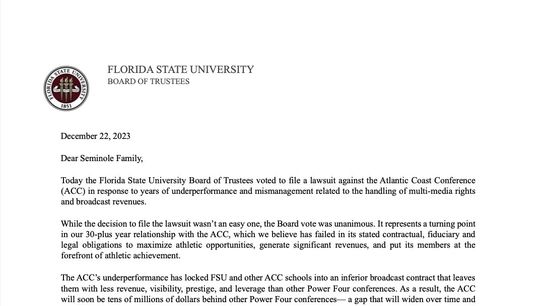Florida State is moving forward with the first step in a process that, if successful, will see the university eventually leave the ACC.
In a meeting held Friday morning, the FSU Board of Trustees authorized the university to challenge the ACC's grant of rights contract in court. The lawsuit will be filed in Tallahassee Circuit Court today.
The ACC signed the GoR in 2013 after Maryland left for the Big Ten and Louisville joined. The conference then re-upped its GoR in 2016 in order to get ESPN to invest in the ACC Network. Florida State signed both documents.
The agreement pledges all of its members' media rights back to the conference through 2036, meaning that any money Florida State hypothetically earns as a member of the SEC or Big Ten would belong to the ACC, not its new conference. That's on top of a $120 million exit fee. Florida State says it would cost $572 million to leave the ACC if a school were unable to break the GoR.
"The Severe ACC Withdrawal Penalty is so exorbitant and disproportional to what FLORIDA STATE receives from the ACC for its media rights, that it restrains trade and restricts FLORIDA STATE from withdrawing from the ACC and competing on an equal footing for talent even within its home State rivals," FSU argues in the lawsuit.
The strength of the ACC's GoR has not been challenged in court -- until now.
In fact, the grant of rights has hardly even been seen by the universities it governs. The physical copy of the contract is kept at ACC headquarters, where it cannot be copied or removed.
None of the Florida State board is against. Collins tells Ashburn: "Please move forward and file the lawsuit."
— Pete Thamel (@PeteThamel) December 22, 2023
Florida State has made no effort to conceal its belief that the ACC's TV contract (wholly owned by ESPN) is holding the university and its football program back from competing nationally. The ACC created a new program this spring that will financially reward programs who succeed on the field, but Florida State said that would not keep the Seminoles in the ACC.
Of note: The grant of rights ties ACC schools to the conference through 2036, but the ACC is technically only under contract through 2027. After 2027, ESPN has the exclusive option whether or not to extend its ACC contract.

"It's not going to get us there. Let's say it gives Florida State $6 million more a year. Okay, well now we're not losing $35 million a year, we're losing $29. It's still insurmountable," FSU chairman Peter Collins said in August.
And of course it's no coincidence Friday's move comes weeks after Florida State became the first and only undefeated Power 5 champion to miss the College Football Playoff. The Seminoles dropped from No. 4 to No. 5 after defeating Louisville in the ACC Championship on Selection Sunday.
"The stunning exclusion of the ACC’s undefeated football champion from the 2023-2024 College Football Playoff (“CFP”) in deference to two one-loss teams from two competing Power Four conferences crystalized the years of failures by the ACC to fulfill its most fundamental commitments to FLORIDA STATE and its members," the lawsuit reads.
"Those fundamental commitments – explicitly made and acknowledged in writing by the ACC – include the ACC’s duty to “generate substantial revenues” for its members, a constitutional purpose “[t]o foster quality competitive opportunities for student-athletes in . . . championships,” a mission “to maximize athletic opportunities” for its student-athletes, and a vision “to be at the forefront in . . . athletic achievement.” The ACC has fumbled all four."
FSU trustee (and former Seminole quarterback) Drew Weatherford characterized the lawsuit as an attempt to fix the overall college football system, where money and power have become concentrated within the SEC and Big Ten.
If the courts rule the GoR is unenforceable and wrestles the school free of that $572 million exit fee, Florida State intends to leave the ACC immediately.
As always, stay tuned to The Scoop for the latest.
